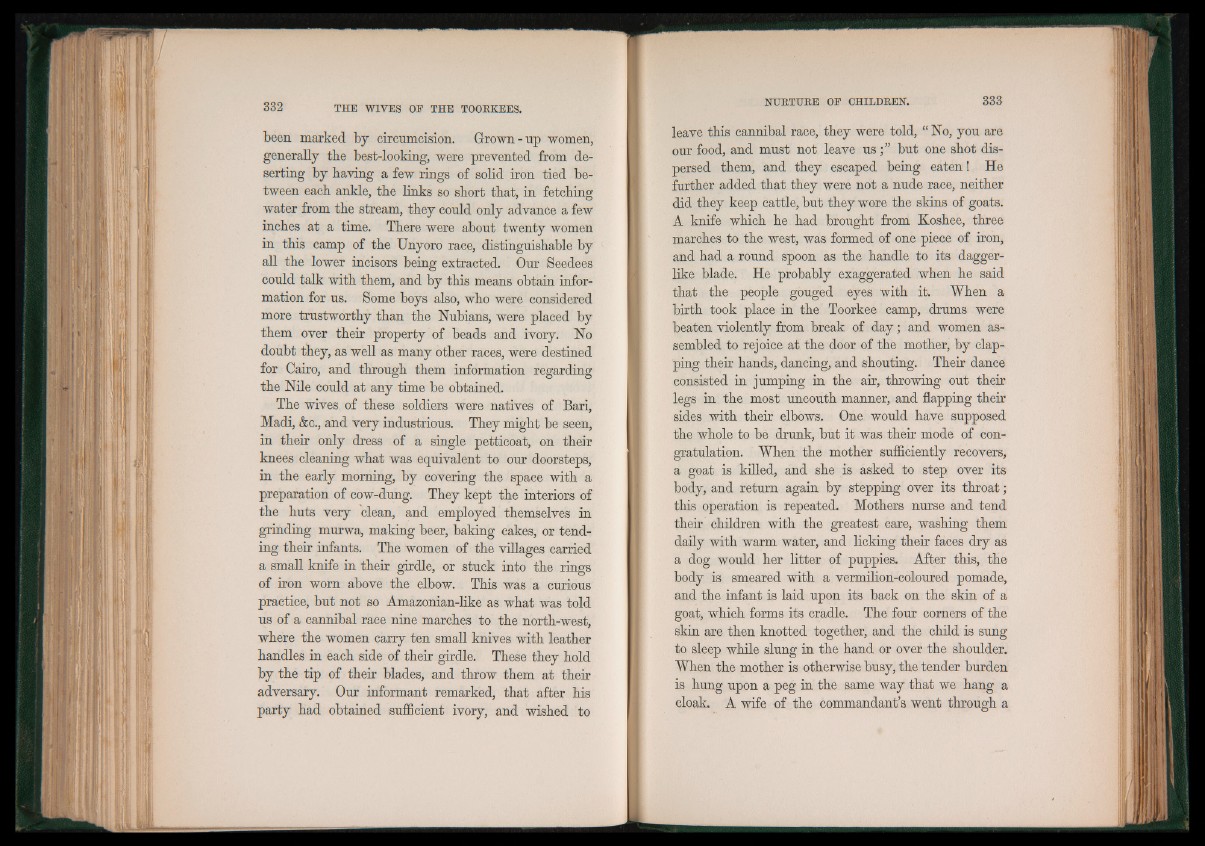
been marked by circumcision. Grown-up women,
generally the best-looking, were prevented from deserting
by having a few rings of solid iron tied between
each ankle, the links so short that, in fetching
water from the stream, they could only advance a few
inches at a time. There were about twenty women
in this camp of the Unyoro race, distinguishable by
all the lower incisors being extracted. Our Seedees
could talk with them, and by this means obtain information
for us. Some boys also, who were considered
more trustworthy than the Nubians, were placed by
them over their property of beads and ivory. No
doubt they, as well as many other races, were destined
for Cairo, and through them information regarding
the Nile could at any time be obtained.
The wives of these soldiers were natives of Bari,
Madi, &c., and very industrious. They might be seen,
in their only dress of a single petticoat, on their
knees cleaning what was equivalent to our doorsteps,
in the early morning, by covering the space with a
preparation of cow-dung. They kept the interiors of
the huts very clean, and employed themselves in
grinding murwa, making beer, baking cakes, or tending
their infants. The women of the villages carried
a small knife in their girdle, or stuck into the rings
of iron worn above the elbow. This was a curious
practice, but not so Amazonian-like as what was told
us of a cannibal race nine marches to the north-west,
where the women carry ten small knives with leather
handles in each side of their girdle. These they hold
by the tip of their blades, and throw them at their
adversary. Our informant remarked, that after his
party had obtained sufficient ivory, and wished to
leave this cannibal race, they were told, “ No, you are
our food, and must not leave u s b u t one shot dispersed
them, and they escaped being eaten! He
further added that they were not a nude race, neither
did they keep cattle, but they wore the skins of goats.
A knife which he had brought from Koshee, three
marches to the west, was formed of one piece of iron,
and had a round spoon as the handle to its daggerlike
blade. He probably exaggerated when he said
that the people gouged eyes with it. When a
birth took place in the Toorkee camp, drums were
beaten violently from break of day; and women assembled
to rejoice at the door of the mother, by clapping
their hands, dancing, and shouting. Their dance
consisted in jumping in the air, throwing out their
legs in the most uncouth manner, and flapping their
sides with their elbows. One would have supposed
the whole to be drunk, but it was their mode of congratulation.
When the mother sufficiently recovers,
a goat is killed, and she is asked to step over its
body, and return again by stepping over its throat;
this operation is repeated. Mothers nurse and tend
their children with the greatest care, washing them
daily with warm water, and licking their faces dry as
a dog would her litter of puppies. After this, the
body is smeared with a vermilion-coloured pomade,
and the infant is laid upon its back on the skin of a
goat, which forms its cradle. The four comers of the
skin are then knotted together, and the child is sung
to sleep while slung in the hand or over the shoulder.
When the mother is otherwise busy, the tender burden
is hung upon a peg in the same way that we hang a
cloak. A wife of the commandant’s went through a